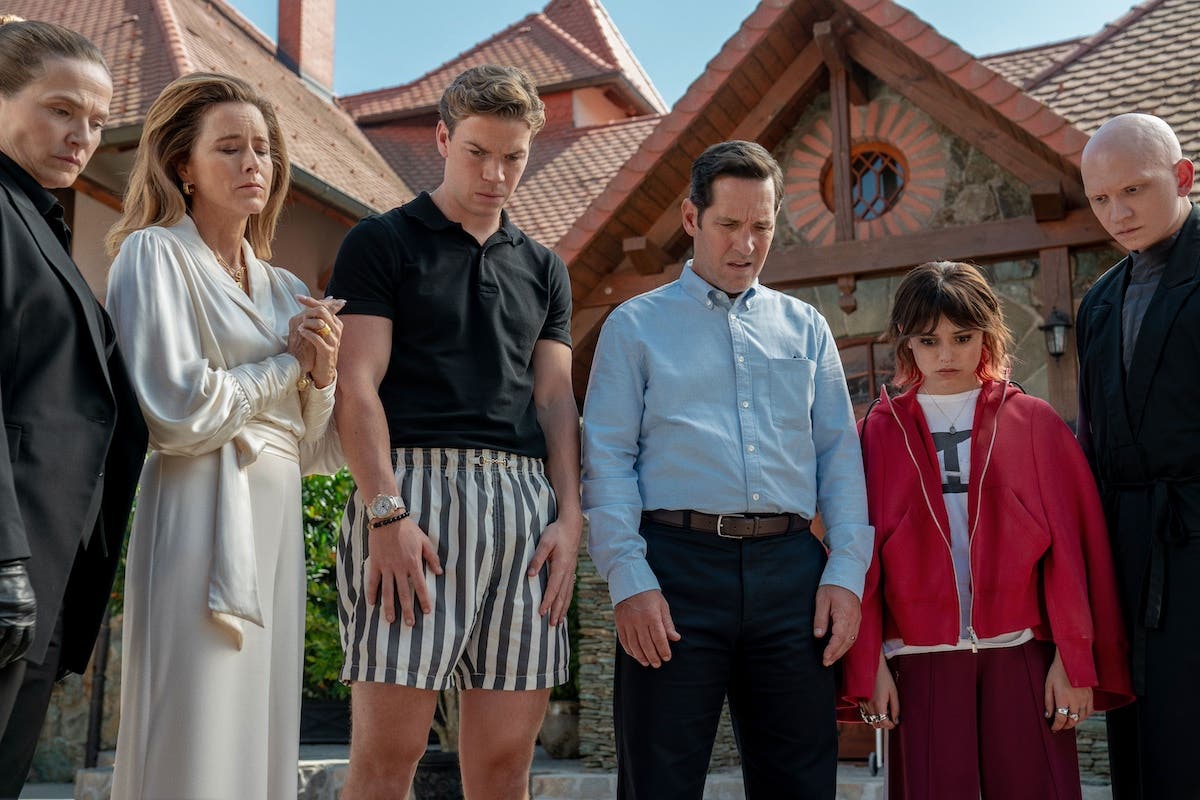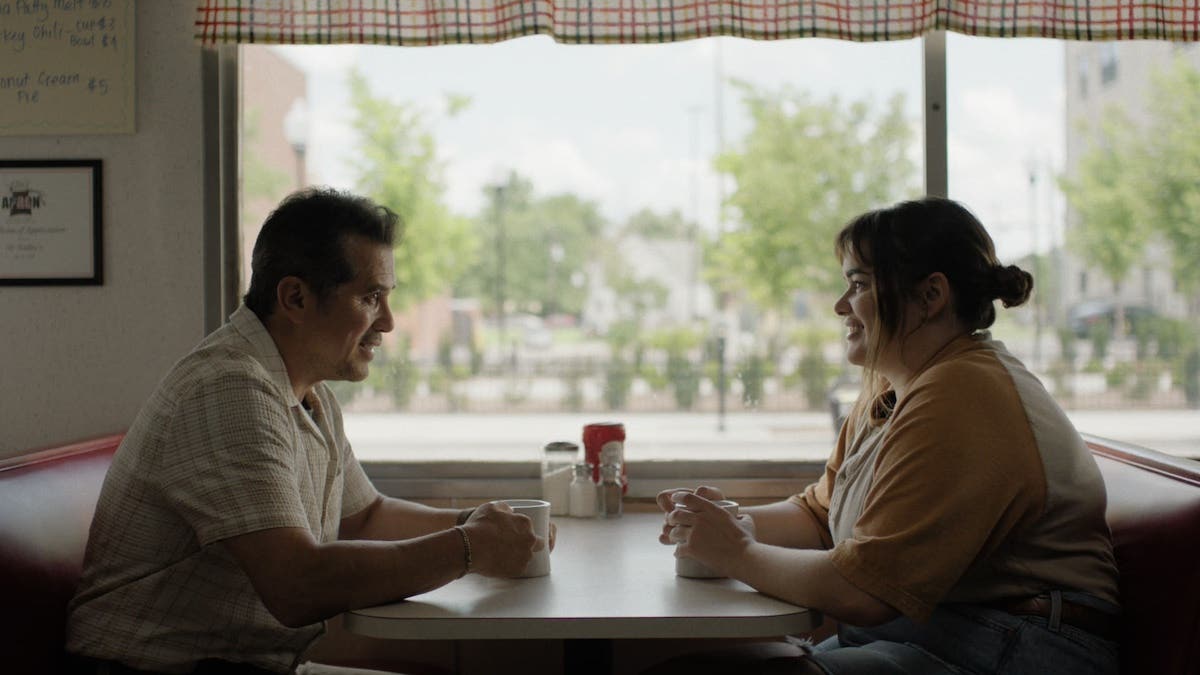WRITERS ON BREAKING IN: Q&A with TV Writer Greta Heinemann
Script talks with TV writer on NCIS: New Orleans, Greta Heinemann, on breaking in, entering screenwriting contests, and inviting mobsters for a holiday dinner.
Script talks with TV writer on NCIS: New Orleans, Greta Heinemann, on breaking in, entering screenwriting contests, and inviting mobsters for a holiday dinner.
I love a good break-in story, and even more so when the screenwriter is generous, talented, humble and straight-out fun. Who wouldn't want to be in a writers' room with a soul like that?
Allow me to introduce you to Greta Heinemann, a new staff writer on NCIS: New Orleans. I picked Greta's brain in hopes her experience might encourage our screenwriting community to not only stay in the game but to also try new strategies for breaking in. As I researched her journey from Germany to the United States, I knew she'd inspire. She certainly inspired me.
JVB: In my stalking of you, I came across a fun post you did for CBS about inviting misfits to join your holiday table. I have to ask, maybe because I’m Sicilian, did you ever get to sit at that table with a mobster?
Greta: I want to think that as hospitable as Sicilians are, mobsters are probably rather careful about which tables they join or whom they invite to join theirs, so to my knowledge I have not yet broken the bread with a real Don Corleone… I have however met some dubious characters involved with organized crime in different ways, ironically the one person who was probably the closest to being a former mobster was a man who switched careers from the extortion business to Hollywood producing… I guess it’s kind of the same skill set, right?
Definitely! What do you think that gift of being open to complete strangers brings to your writing?
First of all I should say that this isn’t a gift but a consciously honed skill, which I ultimately had to learn in the interest of my writing career. I’m a first generation German immigrant and – without diving into a long-rambling analysis of my home country’s past and cultural history, I will say that Germans are mostly raised to keep to themselves. We’re not a very diverse crowd and being extroverted isn’t necessarily on the top of our list, so when I first came here, there was a real learning curve in adapting to a land of complete strangers of all walks of life who effortlessly small-talk their way through the day and are generally more welcoming than my people back home. (Which doesn’t mean were unfriendly, it just means that we don’t warm up as quickly). That has definitely sharpened my eye in terms of observing, adapting and picking up on intricacies and it’s definitely a skill that helps me put myself into the different mindsets of characters and stay true to their cultural identity when writing. It also opens you up to hear all kinds of stories from different people which we all know is writing gold.
Before we talk about your new gig as staff writer on NCIS: New Orleans, I want to just commend you on your pay-it-forward attitude and perspective on Hollywood. With such a cutthroat and dysfunctional reputation this industry has, what’s the biggest lesson you learned about the networking side of the industry that you wished you knew earlier?
I think it’s very important to remember that we’re all in this together and that it’s up to us to fix this cutthroat environment by being genuinely supportive of one another. The biggest lesson I’ve learned about the networking side of things is that you are dependent on other people helping you and giving you a shot and then it is your responsibility to turn around and do the same. It’s all about paying it forward – I was just given my first shot by an incredibly kind showrunner and when I thanked him on the phone he said: That’s the fun part about my job – He’s right, finishing a script or advancing in your career is incredibly satisfying, but helping others – at least to me – feels like a reward that goes beyond.
Tell us about your move to the U.S. Were you pursuing a writing career before you moved here or did that all happen after? If it was before, what was the thing that pushed you to pack your bags and hop the pond?
At the age of 14, I decided that by the age of 30 I would live in America and work in the industry. I think back then I wasn’t sure whether it would be directing, producing or writing, but it was something along those lines. What drove me to the decision back then – and I’m not ashamed to admit it – was a combination of too many hours of Baywatch and Melrose Place (which convinced me that the L.A. weather is the right climate for me) and every 80s action movie imaginable. I actually consciously remember seeing Gale Anne Hurd’s credit on The Terminator and realizing that very moment that women can blow stuff up over here and that that’s what I should be doing. The first step of my big 16-year plan was to learn English, which I did watching movies and TV shows. I joke that my English is the product of Baywatch and The Shield… Then there were some dubious years, forging my way through school, stints in Munich and Berlin, film school in Salzburg, Austria, working several jobs and saving up money to eventually – the first moment I could – come over here and get a lay of the land. From there “life happened.” I was writing and shooting along the way as well, but I’d say that it wasn’t until later that I really figured out that writing was my true passion and that I began to pursue it with a professional work-ethic.
Let’s talk about how you got your big break on NCIS: New Orleans. Was it a series of baby steps, or one giant leap into the writers’ room?
It is an incredible hurdle to jump (and I’m still in disbelief about miraculously having made it over it) but as far as how this came to be – as anything in this town – it was a series of events, paired with the stars aligning and the moon standing in the 7th house (I just like to quote Aquarius).
Let me trace the steps: A bit more than a year ago, I quit my job to intern at Valhalla Entertainment (which is Gale Anne Hurd’s company. Given she inspired me to follow this path, it was kind of on my bucket list… regardless, their little show called The Walking Dead). At the time, they were developing a script that I got my hands on and that I simply LOVED. A couple of weeks later, on Facebook, I saw a friend of mine congratulating her friend – the writer of that script, Jeffrey Lieber, for taking the wheel on NCIS: New Orleans. Given he was a friend of my friend and I loved his script so much I then did what I never do: I Facebook-messaged him to tell him how much I loved his script, and he messaged back, and we chatted for a moment, and then I made an embarrassing typo and thought to myself: Good thing I never have to talk to this guy again. That’s the prelude to the story, but after that, I kind of felt like I should follow the show and support the guy who I think is incredibly talented. Then, last October, I got accepted into the CBS Writers Mentoring Program, which is an incredible program lead by incredible people, teaching young writers incredible skills.
And then, in January of this year, I switched representation and ended up at Madhouse Entertainment working with the incredibly smart and hard-working triple threat: Chris Cook, Ryan Cunnigham and Robyn Meisinger. Robyn, besides being an incredible force of nature, also happens to be Jeffrey Lieber’s manager of many years (I believe he was effectively her first client)… so you see where things are headed.
Staffing season came upon us and while the CBS program was teaching me some invaluable meeting and room skills, my folks at Madhouse worked their butts off to get my material in front of people and one of Robyn’s calls was to Jeffrey who happened to have a staff writer slot available and who agreed to read me. With Robyn and the program vouching for me, and my material not falling short, I then got to meet the guy who, no matter who you’ll ask, is literally one of the nicest guys in town and (despite the Facebook-stalking story) I must have somehow succeeded in convincing him that I am A) not crazy, B) a good person and C) valuable to his show – and then with the CBS Program backing me and the CBS executives on my side (which is an important piece of the puzzle that I was not aware of before going through this) this all came together.
As you can see, there’s a lot of factors coming into play that are out of the writers (my) control. I was incredibly lucky.
Love the serendipity with Jeffrey. I read you also have a TV pilot you wrote that’s getting you a lot of meetings. We always hear about needing a great writing sample to open doors, but do you have hopes it has commercial appeal and will get picked up?
I think nowadays where it is not impossible for young writers to sell something, writing anything in the mindset of using it as just a writing sample is selling yourself short. You need to take the promise of a series seriously and treating a pilot as a writing sample might subconsciously lead you to say: “I just have to impress with an hour” – so to answer the question, I wrote the pilot script with a series in mind that I would love to see on the air. Do I hope it has commercial appeal and will get picked up? Of course, who doesn’t? But there are many, many factors in play here, so if all the script does is get me meetings with amazing, smart and talented people I won’t complain either.
How many re-writes did it take?
It’s funny you bring this up. I’m usually a very anal outliner and don’t go to draft until it’s 90% right. So, usually, my first draft is pretty solid and goes to polish, but in this particular case, because the material is exploring some very complex characters and dynamics in a set-up that almost feels more like a novel than a pilot hour, I actually wrote a first draft that needed significant rewriting and restructuring to become a solid TV pilot. I don’t tally rewrites because it’s all part of one process, but in this case I had a first draft that I had to toss out the window to find my second approach, which then ultimately became the final draft.
I'm sure your process has evolved over time. How many scripts have you written and at what pace are you coming out with new material?
I started writing features already back in Germany and had probably written 3 really bad ones before coming to America where I proceeded to write two more that were still not particularly good, but one got some runner-up placements in some writing competitions. That then – about three years ago – lead me to a workshop at NBC that turned me on to TV writing. Inspired by that workshop, I then signed up for UCLA extension classes, wrote two TV specs of existing shows in 6 months, then wrote a pilot in three months and that pilot then became the sample that got me into the CBS program and the HUMANITAS New Voices program. But, alongside that, I kept turning out other pilots as well. Generally, I try to have a new script every three months, which gets a bit slower if I work on more scripts at once… and obviously right now my full focus is on NCIS: New Orleans.
My total tally so far is 5 features, 5 specs of existing shows, 6 pilots and countless treatments and outlines.
How different was the process of landing a TV writing job than what you had imagined? Is it all you thought it was going to be?
I think we all tend to think very goal oriented and forget that there’s always a road you need to travel in order to reach them… So, while I may not have anticipated all the little steps along the way, I always expected it to be quite an obstacle course and in that matter it definitely was what I expected... maybe even a bit more.
Did you ever use script consultants? If not, who gave you notes before you broke in?
When I first placed in some writing competitions I would take the competition coverage notes very serious and later, during my UCLA extension classes I would learn a lot from the notes my teachers and peers gave me. While these are not your typical “script consultant” notes, they are notes from very smart and genuine people who are not cookie-cutting through your script and they taught me a lot. Then I got into the waters of navigating my first reps and having to protect what’s important for my career and writing interests over what’s selling right now. That’s when I started working with Lee Jessup who is more a career coach than a script consultant and I trust her because she really knows me, my voice, and my career goals. She focuses on giving me notes that best transport who I am as a (shudder) brand on the page as opposed to just producing a script that’s high concept enough to potentially score a quick sale but could be written by a robot. It was actually Lee who kept me honest about the draft of the pilot I talked about earlier. Any other script consultant would have probably just shat all over the script and potentially scared me off from seeing it through, but she helped me protect my vision while still holding me responsible to actually writing a script that can work commercially. Understanding and executing notes is one of the key skills in this career. I take it very seriously.
Since you have experience with them, what are your thoughts on screenwriting competitions?
What good does a script do if it’s in your drawer? Before I had reps, I was all over contests and placed in several of them. While I probably wasted a shitload of submission fees to the ones that don’t do anything beyond making you feel good about yourself for about a day, there were some that made a big difference. The UCLA Writers Competition being probably the most important one. After winning with one script and placing second with another I got reading requests from all over town and my second manager…
How long did it take to break in, from when you wrote your first script to now? Did you work in any other part of the industry before breaking in?
If I counted from the time that I wanted to break in, it would be 15 years but counting from when I got really serious about TV writing and started to treat it like a career, it’s been three. During that time (and before) I worked as producer, although more on the reality and web side of things… while it added some producing skills to my resume, I’d recommend to go the PA/assistant route if you can – it’s just a more predictable path into the writers' room and the best training you can get. I don’t envy those who do the job because it’s crazy hard work that cripples your personal writing time, but if you’re doing a banging job it usually pays off – and you got the best writers-room/industry boot camp out there.
How did you financially survive until you broke in? How did you manage your time between your job and your script work?
I was always able to survive on very little money because A) I never had any and B) I always had to squirrel some of my cash away to save up for my leap to America. (And having not studied in the US, I am debt free which sadly is rather unusual amongst folk of our age)… So, while working in digital producing, I saved up all my money and took the last year off of work to fully focus on writing, which I then treated like a real 8-hour job, seven days a week…
But even with my day job back when, I probably got in around 5 writing-hours a day by getting up early and writing before work and going back to it after getting home. I think if you have the limitations of a job you naturally get more efficient when you write. In my case I just wouldn’t let myself procrastinate for too long, which is a very valuable skill to hone, especially in the TV world.
How confident do you feel now that you’re "in"?
I literally just started three weeks ago, so this is all still very new but the one thing I am sure of is that nothing can prepare you for the room like actually being in it. My confidence-level right now is probably best described as the one of a kid that played solid basketball in school and is suddenly thrown into an NBA game... It’s intimidating, challenging and exciting at the same time and I’m learning an incredible lot from the prolific people around me while hopefully finding a way to support them.
I recently heard Glen Mazzara, one of my favorite writers and showrunners, speak at a WGA panel where he mentioned that staff writers are considered to be “an investment” – I try to remind myself of that to keep myself calm: You’re given the opportunity to learn; people want you to succeed; nobody expects you to hit it out of the park and keep up with veteran writers, but what is expected from you is that you work hard, contribute in a supportive fashion and show the growth every investor would like to see in their market-stock… we’ll see how this works out for me.
One of our readers has a pressing question I’m sure all L.A. writers can relate to. “How come there's no decent pizza in the entire state... I mean, when I move there what am I supposed to do? Import every week from Chicago?” If this claim is true, I might have to stay in NY forever.
I can relate, although for me, it’s more about Bavarian beer… the good news is that moving to a place that doesn’t have decent pizza in order to pursue a career that has you sitting on your ass all day ultimately might turn out to be a health benefit.
True. So now here’s my favorite question. Imagine yourself as giving a commencement speech to a group of high school graduates, and your younger 18-year-old self is in the audience. What would you say to the group, especially to her?
Good one. I actually had to Google what exactly a commencement speech should be as we don’t have that in Germany… anyhow, while I’m tempted to simply write the speech right now, I have some “real” work to do so I’ll keep it to my concept notes—
I’d borrow a lot of the sentiment from a speech that President Obama recently gave at a “My Brother’s Keeper” event. Addressing young boys and men of color, he stated that he grew up without a father, and that he often felt the lack of a clear path, and that he struggled to find his way, but that the only difference between him and a lot of other young men growing up in tough neighborhoods in the country was that he grew up in a more forgiving environment. At key times in his life and even after he failed, people were willing to give him a second, sometimes even a third chance. They gave him guidance, and reminded him that he matters. – I had an interesting upbringing and I can relate quite well to what the President was speaking about here, and I was equally lucky in terms of having been raised in a forgiving environment and having had key-figures in my life who reminded me (at the very right times) that I matter and that what I make out of my life matters as well.
I would then remind the students that they not only matter, but that they also have the right to dream. It is their life ahead of them and as far as we know we only get one, so no matter if mom wants them to become a pediatrician, they have to follow their heart and dream big and bold and be happy and usually, when the kid is happy, mother will eventually be happy too.
This is then where I’d tough love it a bit because I think a lot of young people today need a little nudge there (and I’m including my generation) -- the right to dream and to follow our heart comes with an obligation. A vow, if you may choose to call it that, to work hard and tirelessly for what we believe in, because it is too easy to sit back and be lazy and blame the universe for not giving us what we want without ever having worked for it.
And I’d probably also slip in something about being kind to one another and paying it forward…
My 18-year-old self would at this point probably have already ducked out to get a drink before everybody else (because in Bavaria we can) – she was not one for sappy sentiments and had to learn every piece of advice the hard way.
Follow Greta Heinemann on Twitter: @GretaHeinemann
- More articles by Jeanne Veillette Bowerman
- More Writers on Breaking In
- Writers' Room 101: Networking the Right Way
Want to learn more about screenwriting from the comfort of your home? Check out the upcoming courses at Screenwriters University!
BROWSE COURSES NOW!
Jeanne Veillette Bowerman is a Senior Executive at Pipeline Media Group and Book Pipeline, Editor-in-Chief of Pipeline Artists, Director of Symposium—a year-round conference in the arts, co-host "Reckless Creatives" podcast, partner at Fringe Press, former Editor-in-Chief of Script magazine and a former Senior Editor at Writer's Digest. Recognized as one of the "Top 10 Most Influential Screenwriting Bloggers," her "Balls of Steel" column was selected as recommended reading by Universal Writers Program. A compilation of her articles is now available at The Writers Store—Balls of Steel: The Screenwriter's Mindset. She is also Co-Founder and moderator of X's weekly screenwriters’ chat, #Scriptchat, and wrote the narrative adaptation of the Pulitzer Prize-winning book, Slavery by Another Name, with its author, Douglas A. Blackmon, former senior national correspondent of The Wall Street Journal. More information can be found on her website. X: @jeannevb | IG/Threads: @jeannevb_ | BlueSky: @jeannevb.bsky.social





